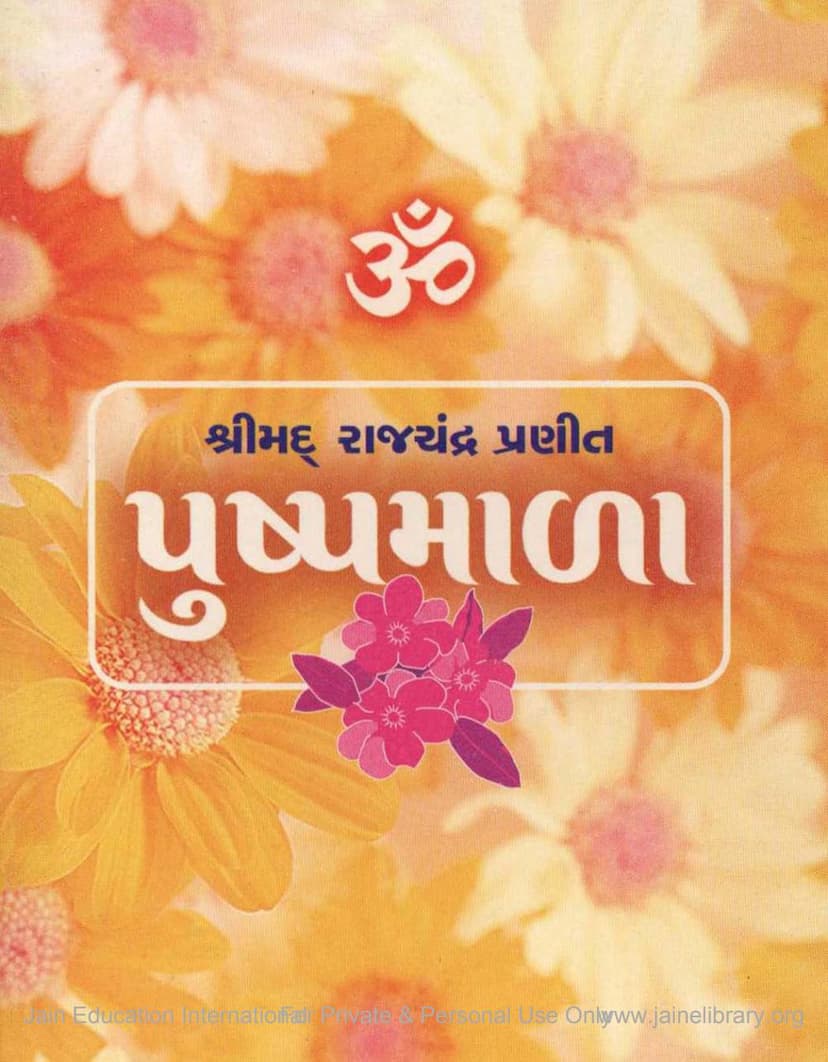Pushpmala
Added to library: September 2, 2025

Summary
This document is a Gujarati Jain text titled "Pushpmala" (meaning "Garland of Flowers"), authored by Shrimad Rajchandra and attributed in part to Atmanandji Maharaj. It is published by Shrimad Rajchandra Sadhna Kendra Koba.
The book is presented as a collection of spiritual guidance and reflections, offering advice for daily living and spiritual practice. The text is structured as a series of numbered points, each offering a specific teaching or contemplation. The core theme throughout the "Pushpmala" is the importance of self-reflection, ethical conduct, and spiritual progress.
Here's a breakdown of the key themes and advice presented in the text:
I. Daily Reflection and Introspection:
- Waking up and reflecting on the past: The text begins with prompts to reflect on the past night and the previous day, encouraging the reader to learn from successes and failures.
- Making the present day successful: It emphasizes utilizing the current day effectively, learning from past mistakes, and avoiding repeating them.
- Time management and prioritization: The book suggests dividing the day into segments for various activities like devotion, religious duty, learning, eating, sleeping, and worldly affairs, urging the reader to allocate time wisely.
- Awareness of mortality and impermanence: The transient nature of life and the physical body is repeatedly highlighted, urging readers not to be attached to worldly possessions or pleasures.
II. Ethical Conduct and Moral Principles:
- Non-violence (Ahimsa): The text advocates for compassion towards all living beings and refraining from causing harm.
- Truthfulness and virtuous speech: Emphasis is placed on speaking calmly, sweetly, gently, truthfully, and purely.
- Self-control and discipline: The importance of controlling the mind, speech, and body is stressed.
- Integrity in livelihood: The text advises against unethical or unjust practices in earning a living.
- Humility and compassion: It encourages acting with humility, showing compassion to others, and avoiding pride.
- Avoiding negative tendencies: The book warns against anger, envy, greed, and indulging in worldly vices.
III. Spiritual Path and Devotion:
- Focus on the spiritual essence: The text encourages looking beyond the physical form and recognizing the soul as the true essence.
- Devotion to the divine: Cultivating devotion to the Supreme Being is presented as a way to purify the mind and achieve liberation.
- Study of scriptures and self-knowledge: The importance of gaining spiritual knowledge through scripture study and self-reflection is highlighted.
- Seeking liberation from worldly attachments: The ultimate goal is presented as detachment from worldly desires and the pursuit of spiritual freedom.
IV. Advice for Different Roles and Circumstances:
The "Pushpmala" offers tailored advice for individuals based on their station in life, profession, or age:
- For those in the world: It advises careful management of time and resources, focusing on spiritual duties amidst worldly responsibilities.
- For renunciates: It suggests contemplating the impermanence of the body and avoiding attachment to worldly attractions.
- For rulers and leaders: It emphasizes justice, the welfare of subjects, and the responsibility that comes with power.
- For businessmen: It stresses ethical trade practices and avoiding harm to living beings.
- For students and youth: It encourages diligence in studies and practicing celibacy.
- For the elderly: It reminds them to focus on spiritual preparation for death.
- For women: It advises righteous conduct towards their husbands and families.
- For professionals (lawyers, doctors, artisans, etc.): It encourages ethical practice and avoiding actions that cause harm or injustice.
- For those facing adversity: It offers encouragement to remain steadfast and seek spiritual solace.
V. Key Virtues and Practices:
The text reiterates the importance of virtues such as:
- Purity (Pavitrata)
- Holiness (Shauchta)
- Contentment (Santosh)
- Gentleness (Saumyata)
- Affection (Sneh)
- Manners (Sabhyata)
- Forgiveness (Kshama)
- Righteousness (Dharma)
- Discipline (Niyam)
Conclusion:
Overall, "Pushpmala" serves as a practical guide for a spiritually oriented life, encouraging individuals to reflect on their actions, cultivate virtuous qualities, and strive for inner peace and liberation. It is a call to live each day with awareness, purpose, and a commitment to ethical and spiritual principles, seeing life as an opportunity for growth and self-realization. The title "Garland of Flowers" suggests that each point is a beautiful flower, contributing to a larger bouquet of spiritual wisdom.